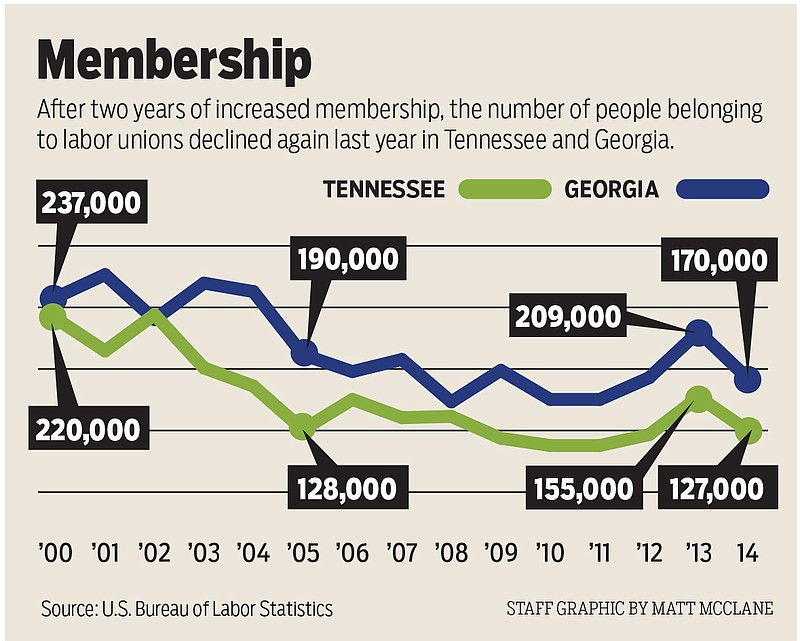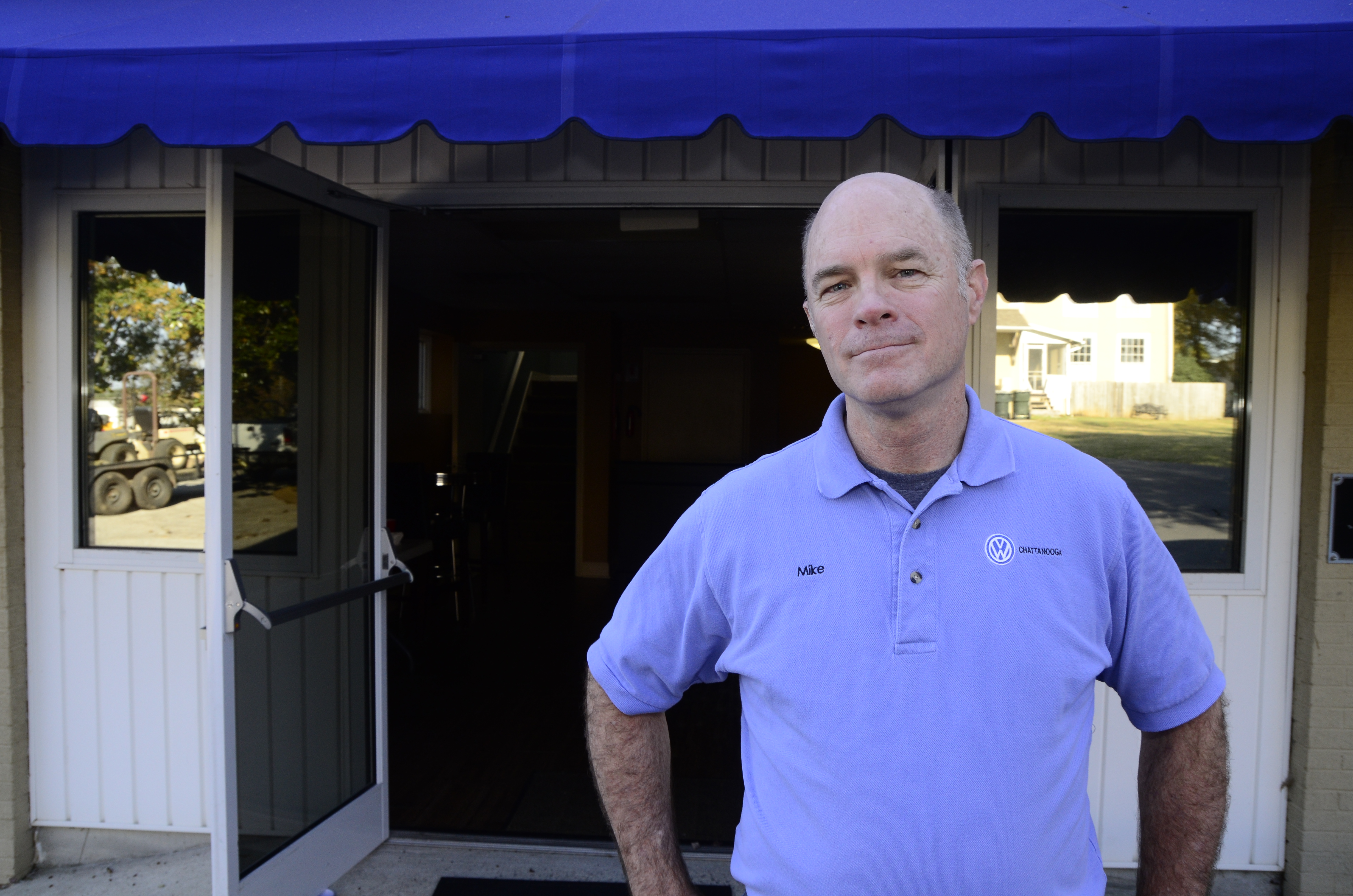The share of American workers belonging to a labor union fell last year to an all-time low with some of the biggest declines for organized labor coming across the traditionally nonunion South.
Despite an increase in union strength the previous two years and ongoing organizing campaigns in the South by the United Auto Workers and other labor unions, the number of workers in Tennessee and Georgia saying they are part of a labor union fell by 67,000 people during 2014, according to a new government estimate. Both states are among those with the lowest share of workers belonging to a union.
"Obviously, the trend across the country has been for a decline in unions for some time, but we're far from dead as some people would like you to believe," said Gary Moore, a former firefighter and state legislator who is president of the AFL-CIO of Tennessee.
States with most membership decline
Southern states had the biggest drop in the percentage of workers belonging to labor unions in 2014 1. South Carolina, 40.6 percent decline to 41,000 members 2. North Carolina, 35 percent decline to 117,000 members 3. Oklahoma, 21.9 percent decline to 89,000 members 4. Georgia, 18.7 percent decline to 170,000 members 5. Tennessee, 18.1 percent decline to 127,000 members Source: U.S. Bureau of Labor Statistics States with lowest union membership Southern states also have the lowest share of workers who belong to labor unions. 1. North Carolina, 1.9 percent 2. South Carolina, 2.2 percent 3. Mississippi, 3.7 percent 4. Utah, 3.7 percent 5. Georgia, 4.3 percent 6. Arkansas, 4.7 percent 7. Texas, 4.8 percent 8. Virginia, 4.9 percent 9.Tennessee, 5.0 percent 10. North Dakota, 5.0 percent Source: U.S. Bureau of Labor Statistics By the numbers 11.2 Percent of American workers who belonged to a union in 2014, down from 11.4 percent in 2013 14.6 million Number of Americans who were in a labor union in 2014 $970 Average weekly earnings of union members in 2014, 21 percent more than the $763 average for nonunion workers in 2014 35.7 Percent of public sector workers belonging to a labor union nationwide, or 7.2 million workers 6.6 Percent of private sector workers belonging to a labor union nationwide, or 7.4 million workers 11.7 Percent of men belonging to unions, compared with 10.5 percent for women Source: U.S. Bureau of Labor Statistic
"In our state, a lot of our membership fluctuations stem from plant openings and plant closings at unionized companies," he said. "But we're still actively organizing workers across Tennessee and having some successes -- and unfortunately also facing challenges to representing some workers."
General Motors' expansion of its Spring Hill, Tenn., facility and the growth in other more heavily unionized manufacturing industries has helped organized labor maintain its private sector presence in the Volunteer State. But like most states, Tennessee unions have their biggest share of the workforce among government employers.
Nationwide, the U.S. Bureau of Labor Statistics estimates that membership in labor organizations fell last year to its lowest level yet, comprising just 11.1 percent of all wage and salary workers.
The number was a modest decline of 0.2 percent from the previous year and continues the movement's gradual decline over the last few decades. It has dropped 9 percentage points from its high of 20.1 percent in 1983, the first year the Labor Department began tracking the number.
The BLS's data showed that just 6.6 percent of private sector workers now belong to a union, while 35.7 percent of all public sector workers -- people employed by the government at some level -- are members.
Dr. Barry Hirsch, chair of the American Workplace at Georgia State University who tracks union membership, cautioned against reading too much into the BLS estimates of union membership in individual states each year. In 2013, the government said Tennessee had the fastest growth in labor union membership, adding 31,000 members. But those gains were more than erased in 2014 when the BLS estimates Tennessee unions lost 37,000 members.
"The data gets a bit noisy, and you shouldn't pay too much attention to any particular year's data for each state since the household survey sample size may lead to some variations," Hirsch said. "But the long-term trend has been for labor unions to represent a lesser share of the workforce, and the South continues to have a lower share of workers -- and less cultural and political support for organized labor."
In his State of the Union speech, President Obama said union membership helps boost wages, which have been flat during the shaky economic recovery of the last few years.
"To give working families a fair shot, we'll still need more employers to see beyond next quarter's earnings and recognize that investing in their workforce is in their company's long-term interest," Obama said. "We still need laws that strengthen rather than weaken unions and give American workers a voice."
The BLS data show the median weekly wage of union workers in 2014 was $970, or 21 percent more than the median weekly wage of $763 for nonunion workers.
U.S. Labor Secretary Tom Perez said that amounts to more than $10,000 per year and said low union membership is one reason for stagnate wage gains.
"When unions are strong, working families thrive, with wages and productivity rising in tandem," he said. "But when the percentage of people represented by unions is low, there is downward pressure on wages, and the middle class takes it on the chin."
The United Auto Workers union, which is working to gain a foothold in the South for the first time by starting UAW Local 42 in Chattanooga for Volkswagen hourly employees, argues that a union would help ensure that production work is done by full-time employees at VW, not contract or temporary workers. UAW claims that a growing share of the work being done at the nonunion Nissan plant in Smyrna is going to contract workers, not employees of Nissan.
But Tennessee Republican leaders, including Gov. Bill Haslam and U.S. Sen. Bob Corker, are skeptical of claims that the UAW would help workers and the state's economy. Both have suggested that a greater UAW presence in Tennessee might discourage automotive suppliers and other businesses from locating in the state.
Haslam cited one example where a business looking to locate a 1,500-employee plant decided last year to build outside of Tennessee, in part, because of concerns over the UAW and other labor unions in the Volunteer State.
"When I was talking to the CEO, that (concern over unions) was the the first thing he brought up and that was the primary concern he voiced," Haslam said. "I can't say that in every discussion I have that businesses are really concerned about that, but it comes up on a frequent basis."
Moore dismisses such stories, claiming that union critics "never give the name of a single business that decided not to come to Tennessee because of unions."
The UAW has had a presence in Tennessee for decades and represents thousands of workers at General Motors in Spring Hill and other automotive suppliers in Cookeville and other places in the state, Moore said.
The high-profile campaign by the UAW to organize workers at Volkswagen is attracting global attention as it could be the first foreign transplant in the South where the UAW gets a foothold with an original equipment manufacturer.
Volkswagen has begun meeting with UAW leaders of Local 42 under a labor policy the auto maker adopted last year. The UAW Local 42 claims to have majority support, and Volkswagen agreed to begin meeting with the union after auditors certified that at least 45 percent of the VW hourly workers supported the UAW.
A rival labor group, organized as the American Council of Employees, has challenged the level of support for UAW and is collecting signatures of its own to gain recognition from VW under the company's labor policy.
Both the UAW and ACE said they want to see a works council labor board set up at the plant, which VW has in nearly all its factories worldwide.
A works council, which can be made up of blue- and white-collar employees, oversees day-to-day operational issues such as schedules, safety and training.
Mike Burton, a VW worker and ACE's interim secretary, said last year he expects VW to recognize ACE under the company's labor policy once the group hands over signatures of its supporters. ACE has set up an office near the VW plant on Bonny Oaks Drive where volunteers are collecting signatures and support for the alternative labor group to the UAW.
"We're going to forge forward," Burton said.
Maury Nicely, an attorney for ACE, said last week the labor group hopes to soon submit employee signatures to Volkswagen to gain its own recognition.

